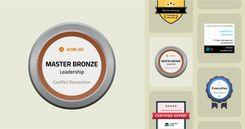Digital Badges: How They transform Skills Recognition and Achievement Validation
in an era defined by technological advancement and rapid skill development, digital badges have emerged as a game-changing tool for recognizing skills and validating achievements.By offering a modern, portable, and verifiable form of credential, digital badges help individuals showcase their expertise and learnings in a way that is both convenient and credible.
What are Digital Badges?
Digital badges are visual representations of accomplishments, skills, or competencies that an individual has earned. Powered by blockchain or secure cloud platforms, these badges provide metadata detailing who issued the badge, when it was earned, and what it signifies. Unlike conventional certificates, digital badges are easily shareable across social networks, email signatures, and professional platforms like LinkedIn, making them a highly effective credentialing system.
- Portable: Easily integrated into online portfolios and social profiles.
- Verifiable: Powered by secure data, authentication, and issuing authority details.
- Dynamic: Can represent a wide range of achievements, from micro-credentials to major certifications.
The Evolution of Skills Recognition
Traditionally, skills recognition relied on paper certificates, degrees, and recommendation letters. These conventional methods frequently enough fell short in terms of portability, instant verification, and granular detail about what was learned or achieved.
Digital Badges vs. Traditional Credentials
- Openness: Digital badges contain metadata outlining specific skills, assessment criteria, and issuing institution.
- Efficiency: Immediate electronic sharing and verification, reducing fraud and misrepresentation.
- Customization: Organizations can create unique, stackable badges for various achievements and competencies.
- Accessibility: Learners worldwide can access credentials without geographic or bureaucratic barriers.
Benefits of Digital Badges for Skills and Achievement Validation
Adopting digital badges for skills recognition brings many powerful advantages for individuals,employers,and education providers:
1. Enhancing Employee and student Motivation
- Instant feedback boosts learner engagement and satisfaction.
- Progress tracking motivates continuous skill development.
2. Facilitating Lifelong Learning
- Micro-credentials recognize incremental progress, making lifelong learning visible and rewarding.
- Stackable badges allow individuals to build personalized learning paths.
3. Improving Recruitment and Promotion Processes
- Easy verification of candidate skills and achievements.
- Reduces HR time spent on credential validation.
- Helps match candidates with job requirements using actual, demonstrable skills.
4. Promoting Equity and Access
- Removes barriers for non-traditional learners by focusing on real skills rather than degrees.
- Accessible global validation nonetheless of socio-economic background.
5.Supporting Organizational Branding
- Institutions gain visibility when digital badges are shared online.
- Badges promote organizational values and standards in the wider community.
How Digital badges Work: Issuing,Sharing & Verifying
Issuing Digital Badges
organizations—including universities,businesses,and certification bodies—use specialized badge platforms such as Credly,Open Badges,or Badgr. The process typically involves:
- Defining the skill, competency, or achievement to be recognized.
- Creating badge graphics and corresponding metadata (criteria, issuer, dates).
- Deploying the badge digitally to users who meet the achievement criteria.
sharing Digital Badges
Recipients can share their badges on professional and social networks, digital CVs, and email signatures. This enhances visibility for both the badge earner and the issuing organization.
Verifying Digital Badges
each digital badge includes authentication links and detailed metadata, allowing employers or institutions to instantly verify the achievement’s legitimacy online, reducing credential fraud.
Real-World Case Studies
- IBM Skills Academy: IBM issues digital badges for technical skills such as cloud computing and data science. Employees use these badges for internal promotions and external career advancement, creating a global, shareable skills portfolio.
- Mozilla open Badges: As one of the pioneers, Mozilla’s Open Badges initiative enabled educators across the globe to issue badges for coding skills, digital literacy, and soft skills—driving recognition among learners from diverse backgrounds.
- Microsoft Learn: Microsoft’s online education portal awards badges for course completions and technical achievements, motivating learners and providing verifiable credentials for employers.
Practical tips for Maximizing Digital Badge impact
- Choose Reputable Badge Platforms: Select platforms like Credly,Badgr,or Acclaim that offer robust verification,integration,and sharing features.
- Integrate Badges into Learning Pathways: Embed badge earning opportunities within educational curricula, training programs, or onboarding processes.
- Promote Your Badges Online: Share badges on LinkedIn, digital portfolios, and networking sites to boost your professional profile.
- Leverage Metadata: ensure your badge metadata clearly specifies skills, assessment criteria, and issuing authority for maximum credibility.
- Stack and Combine Badges: Build a diversified portfolio by stacking badges from different sources and competencies.
First-Hand Experience: Embracing Digital badges
“Receiving my first digital badge after completing a data analytics course had a huge impact on my career. I added it to my LinkedIn profile and immediately noticed an uptick in recruiter interest. The badge included verified skills and real-world project criteria, which made validation effortless for employers. It felt empowering to have skills recognition that went beyond a traditional certificate.”
—Alicia W., Data Analyst
Like Alicia, millions of learners and professionals are discovering the transformative power of digital badges. By providing instant validation and global recognition, these credentials can open new career pathways, encourage constant learning, and foster a culture of achievement in any field.
Conclusion: The Future of Skills Recognition Is Digital
digital badges are more than trendy visuals—they represent the future of skills recognition and achievement validation. By leveraging portability, transparency, and verifiability, digital badges empower learners, employers, and institutions alike. If you want to advance your career, establish your expertise, or create a culture of recognition, now is the perfect time to explore and embrace the potential of digital badges.
Ready to start your digital badge journey? Explore reputable badge platforms, align badges with your learning goals, and start sharing your achievements with the world. The transformation of skills and achievement validation is happening now—be part of it!

